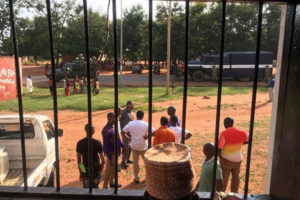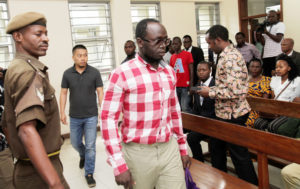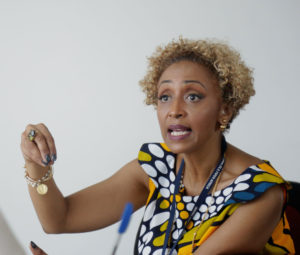By Ben Taylor
Are the 2019 local elections a foretaste of 2020?

Police prevent a planned ACT-Wazalendo rally in Mwanga Centre grounds in Kigoma due to “security reasons” (January 2020). Photo – ACT Wazalendo
Local government elections held in November 2019 resulted in overwhelming victories for candidates of the ruling party, CCM, after the leading opposition parties, Chadema and ACT-Wazalendo, boycotted the poll. In the elections – for new village and street chairpersons nationwide – CCM ended up with over 99% of all posts.
Chadema cited “mass disqualification of the party’s candidates” as their main reason. “It’s a sham exercise and the level of brazen irregularities cannot be tolerated,” said party chairman, Freeman Mbowe. Similarly, ACT-Wazalendo party leader Zitto Kabwe said his party did not agree with the grounds given by election returning officers for disqualifying their aspirants. Election officials had effectively locked out thousands of opposition candidates over reasons their parties described as flimsy and orchestrated. This include not writing full names, misspellings, blank spaces, improper forms and incorrectly written dates among others. Others could not get forms as officials were found to be unavailable. As a result, even before the boycott, many CCM candidates were standing unopposed.
The diplomatic community, including the US Embassy and UK High Commission expressed their concerns, questioning the credibility of elections without any meaningful opposition participation.
“That is their opinion, but what I know is that the elections were free and fair, and were in line with Tanzanian laws and regulations,” said the Minister of State in the President’s Office for Regional Administration and Local Government, Mr Selemani Jafo.
President Magufuli said the opposition parties exercised their democratic right through boycotting the polls.
Mr Mbowe said it was now the time for a free and independent electoral commission to be established to steer the democratic process away from partisan interests that jeopardise the wellbeing of the nation.
ACT-Wazalendo’s secretary general Dorothy Semu said: “It is time for the opposition parties to join forces to fight against this oppression.”
Dr Aikande Kwayu, an honorary research fellow at the Department of Anthropology, University of Wisconsin Madison, supported the boycott. “It is a strong political statement expressing the disillusionment with how elections are organised,” she said.
However, Dr Richard Mbunda, a political analyst from the University of Dar es Salaam (UDSM), pointed out that no party has ever withdrawn from an electoral process and succeeded in its plans. “An election is like war and those shortcomings are unavoidable. What the opposition needs to do is to fully prepare to become a competitive side. There would be no cancellation of elections. By opting out, they lose legitimacy before the public,” he said. He added that he understood the reasons given by opposition parties but now was the time to focus on preparing for the next election.
Looking forward to 2020, Dr Kwayu is worried by the trend. “Looking at how the events have unfolded, I get some feeling that there might even be no elections in 2020,” she said.
Chadema leaders expressed similar concerns. “If the laws remain the same, what is happening in the civic elections will have disastrous consequences in the general election,” warned Mr Mrema, Chadema’s director of protocol, communications and foreign affairs.
Whether or not opposition parties repeat their boycott in 2020 remains to be seen. However, all the signs are that space for public debate and political campaigns will remain tightly controlled as the election draws nearer.
In early January, police declined permission for ACT Wazalendo to hold a rally in the constituency of party leader, Zitto Kabwe, while CCM were granted permission for a similar event. Along with most prominent leaders of both ACT Wazalendo and Chadema, Mr Kabwe remains distracted (or more) by ongoing court cases against them.
In September, for example, The Kisutu Resident Magistrate Court found nine Chadema top officials including the party’s national chairman Freeman Mbowe with a case to answer. Mr Mbowe and the eight others face thirteen charges, including sedition.
Further, ACT-Wazalendo chief party advisor and former Vice President of Zanzibar, Mr Maalim Seif Sharif Hamad was interrogated by police in Pemba in January. He was accused of holding an illegal public rally on December 9, 2019 in Michiweni, Pemba. Along with his co-accused, Mr Hamad maintains that they didn’t hold a rally rather they held an internal party meeting to collect views as the party prepares the 2020 election manifesto.
Small shifts in Chadema leadership
Mr Freeman Mbowe has retained his position as Chadema national chairman in an election held on December 18, 2019. Mr Mbowe who has led the party since 2004 scooped 886 votes (equivalent to 93.5%), while his only opponent Mr Cecil Mwambe picked up 59 votes. The last such election was held in 2014.
The same election process saw Chadema legal director Mr Tundu Lissu elected as the new party vice chairman (mainland) after the incumbent Professor Abdallah Safari stepped down. Mr Lissu was elected unopposed after his main competition for the position, the MPs Sophia Mwakagenda and Saed Kubenea both opted to withdraw their candidacies.
Mr Lissu, the former Singida East MP, has been outside the country for two years now after surviving an assassination attempt.
Following his election, Mr Mbowe appointed Kibamba MP John Mnyika as the party’s new secretary general, replacing Dr Vincent Mashinji. He also appointed Mr Benson Kigaila as the party’s new deputy secretary general (Mainland) and retained Mr Salum Mwalimu as the deputy secretary general (Zanzibar).
Further crackdowns on government critics, further criticism of the government on human rights
The list of politicians, journalists and rights activists to have disappeared or been arrested in Tanzania continues to grow. Besides the politicians mentioned above, in the past few months the most notable cases include Tito Magoti of the Legal and Human Rights Centre (LHRC), and the former President of Tanganyika Law Society (TLS), Fatma Karume.
Mr Magoti disappeared in suspicious circumstances shortly before Christmas. His friends and LHRC colleagues stated that a group of six people in plain clothes confronted him, handcuffed him and bundled him into a Toyota Harrier. Only later did police in Dar es Salaam confirm that they were holding Mr Magoti.
The police statement was less than forthcoming, however, not stating what Mr Magoti was accused of having done, nor where he was being held.
LHRC executive director, Anna Henga, said the laws of the country provide for suspects to be granted bail or arraigned in court within 24 hours of arrest, noting that he had already been held for over 48 hours by that point. “He was supposed to be granted bail because it is his right. We will, therefore, use legal and judicial procedures for him to be bailed,” she said. She added that LHRC had visited all the major police stations in the Kinondoni Region looking for Tito, but in vain.
“This has been a growing trend as security organs can arrest civilians secretly and hold them for a long time without information being communicated to families and relatives,” she said. Mr Magoti was eventually charged with money laundering, together with an information technology expert, Mr Theodory Faustine. Under Tanzanian law, this charge does not permit bail.
Money laundering is the same charge facing Erick Kabendera, an investigative journalist, who remains in custody since July 2019. In January, he was refused permission to attend his mother’s funeral.
Fatma Karume became a high profile and outspoken critic of President Magufuli during her term from 2018 to 2019 as President of Tanzania’s bar society, TLS. Since then she has become a regular presence in the Tanzanian media and has taken up several constitutional cases to challenge what she sees as the erosion of the rule of law under President Magufuli. She is the granddaughter for the first President of Zanzibar, Abeid Amani Karume and daughter of former Zanzibar President Amani Abeid Karume.
In September, Ms Karume was suspended from practicing as a lawyer in Tanzania by High Court Principal Judge Eliezer Feleshi. The Judge accused her of impropriety in her handling of a particular case, without specifying what exactly she had done.
The case, in which Ms Karume was representing Mr Ado Shaibu, challenged President John Magufuli’s appointment of Prof Adelardus Kilangi as Attorney General. Ms Karume, who was not in court during the ruling was accused of impropriety in her submission, and has since cried foul, saying she was condemned unheard.
She later said that suspending her license would not dampen her spirit or stop her from championing social justice, the rule of law and good governance. “You never know what this means and what lies ahead as fate works in many ways. Maybe this is telling me that I will not bring desired change to society via the route of the law in court but elsewhere. Maybe I should be in politics,” she told journalists.
More broadly, the Media Council of Tanzania (MCT), a press freedom advocacy group, raised the alarm about violations of press freedom in Tanzania. They noted an increase in threats and interference in editorial independence, including serious violations committed by government authorities, state organs, self-styled activist and non-state actors.
A surprise move by the government came when it withdrew the right of individuals and NGOs to directly file cases against it at the Arusha-based African Court on Human and Peoples’ Rights. The Tanzanian Minister of Foreign Affairs and East African Cooperation, Prof Palamagamba Kabudi, signed the notice of withdrawal of the declaration made under Article 34(6) of the African Court Protocol on November 14. Tanzania becomes the second country after Rwanda to take this step.
The decision came shortly after the African Commission on Human and Peoples’ Rights, the African Union’s human rights body, condemned “massive human rights violations” by authorities. In its statement, the commission highlighted a reluctance to investigate serious human rights breaches like that of the disappearance of freelance journalist Azory Gwanda. It also came at a time reports indicate the country had the highest number of cases filed by individuals and NGOs as well as judgments issued against it by the African Court. Out of the 70 decisions issued by the court by September 2019, 28 decisions, or 40%, were on Tanzania.
“The many cases filed against Tanzania at the African Court speak to the abject failure by the country to provide victims of human rights violations adequate and effective remedies nationally”, said Japhet Biegon of Amnesty, a human rights group.
Finally, both Amnesty and Human Rights Watch issued scathing reports in September on the state of human rights in Tanzania. For both organisations, these were the first detailed reports on human rights in Tanzania for many years.
Government actions, noted the reports, have had a chilling effect on the rights to freedom of expression, association and peaceful assembly, with people’s censoring actions perceived as critical of the government for fear of prosecution or other reprisals. Amnesty accused the government of President Magufuli of “disembowelling the country’s human rights framework”.
“Tanzania should show true commitment to protecting and fulfilling the rights to freedom of expression and association. The authorities need to put a stop to harassment, intimidation, and arbitrary arrests of activists, journalists, and opposition members,” said Oryem Nyeko, Africa researcher at Human Rights Watch.
Mr Ngemela Lubinga, the CCM secretary for International Relations dismissed the reports. He denied any violation of human rights in Tanzania, stressing: “We cannot run our affairs as a nation based on how the international community perceives us. Rather, we will live by the rules and norms of our country as an independent nation. We cannot implement recommendations that are not aimed at creating peace – but aim at dividing the nation.”
The government has previously argued that democratic rights are a secondary consideration, a luxury that should only be given serious attention once more concrete improvements – such as transport infrastructure, power generation, public services and poverty reduction – have been delivered.
Tanzania ranks low for mobile phone protections
Tanzania has some of the harshest SIM card monitoring policies in the world, joining the league of Saudi Arabia and North Korea, according to recently published research. This includes use of fingerprint technology for SIM card registration and other measures that enable the government to track and monitor users and build in-depth profiles of their citizens.
The research, published by Comparitech, a UK-based firm, puts Tanzania in last place out of 150 countries, below even Saudi Arabia (149th) and North Korea (joint 147th with Uganda). The report also notes that Tanzania does not have a comprehensive data protection law.



Pingback: Tanzanian Affairs » TA ISSUE 125